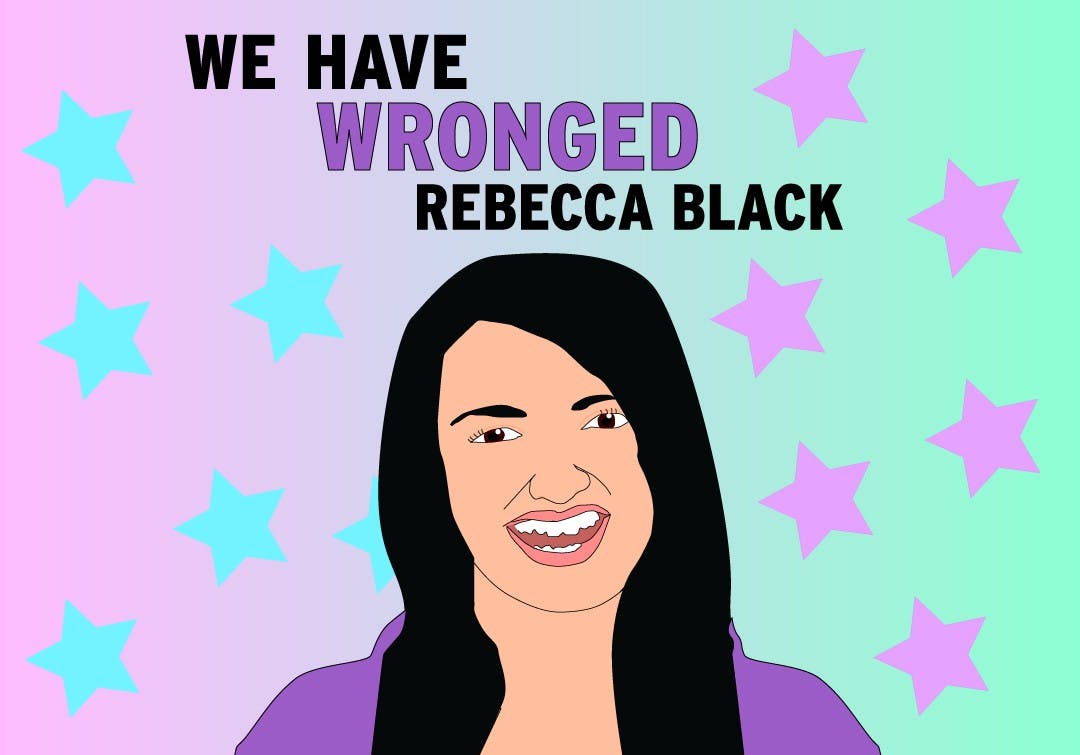I’ve been thinking about just how blatantly we, as a collective society, delight in absolutely ripping each other apart.
When Rebecca Black, in early 2011, put out her debut single “Friday,” my seventh-grade self jumped at the chance to join in on the trending disdain for her and the song.
My mom showed me the music video one morning before school. I am by no means a music aficionado, but I knew what auto-tune was, and knew its glaring overuse in the song could do little to salvage the mind-warpingly bad lyrics.
Black’s mom paid $4,000 to a production company so her daughter could become some semblance of a pop star. The concept — the idea that fame and significance could be purchased — just screamed “privilege” to me. It fueled my jabs at the cheesy, cheap music video and Black’s voice, which I deemed nasal.
I recently revisited “Friday” after I saw Rebecca Black post on Instagram about the Feb. 10 anniversary of the music video’s release. Nine years after its debut, I’m wondering why we were all so quick to gang up on a then-teen.
Don’t get me wrong. The song is still an incoherent mess, a few crumbs of a catchy beat strung together in the midst of intolerable lyrics and vocal chaos — more ARK Music Factory's fault than anyone else’s. The lyric “tomorrow is Saturday, and Sunday comes afterwards” is still brain-melting, as are the out-of-nowhere rapped verses.
But, listening to the song took me back to middle school, when I was insecure and anxious about my self-image, my body, the way people perceived me. Here's the thing: Black is the same age as I am. I don’t know how, at the time, I thought subjecting another human to that extensive public humiliation was funny.
My now-adult brain thinks we all need to apologize to Black for being such egregious bullies about her song. If you're well-adjusted when you reach adulthood, you start to form a more realistic grip on what actually matters in life. What totally, completely needs to die out is loathing something for the sake of gaining recognition for loathing it.
In the world of pop culture, collectively piling hatred on someone just for clout or attention isn’t a new concept. It's not anything clever or intelligent.
But to be absolutely clear, calling out powerful figures in pop culture for real, critical problems is incredibly important. I’m not saying for us to stop calling out these figures, especially ones who have influence over a wide audience.
Like Logan Paul. Paul, a YouTube personality, thought it was acceptable to take his buddies and film the body of someone who took their own life in a forest. People online didn’t hold back in calling Paul out for his disregard of the person's body and life, especially after Paul later issued a insincere "pity me" apology.
Hold accountable Scarlett Johansson, who, despite her excellence turns as an actress, says she is still tight with her best buddy Woody Allen, a sexual predator.
Don’t even get me started on the Academy of Motion Picture Arts and Sciences – a face in an industry rooted in racism and misogyny and the same organization that took until 2018, yes, 2018, to expel Roman Polanski from its ranks.
Call-out culture can be useful in situations like these. But directing vile comments to a girl who just wanted to be a singer — an innocent dream shared by plenty of people — isn’t something to spend time on.
Like, really? Sending death threats is atrocious, but directing them at an adolescent and telling her to kill herself because she made a truly harmless song about liking Fridays and looking forward to the weekend? Pathetic.
I’m so sorry we made her live through our unwarranted antagonism when there are so many real problems for society to address.
Support student media!
Please consider donating to The State News and help fund the future of journalism.
Discussion
Share and discuss “Column: We wronged Rebecca Black” on social media.








